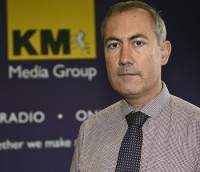 Regional journalists have defended the BBC in the licence fee row while also warning the corporation against “aggressively expanding” its local news output.
Regional journalists have defended the BBC in the licence fee row while also warning the corporation against “aggressively expanding” its local news output.
Culture Secretary Nadine Dorries revealed yesterday that the Tories plan to freeze the licence fee for the next two years before abolishing it altogether in 2027.
Iliffe Media editorial director Ian Carter, pictured, has hit out at Government “threats” to the broadcaster, but says people “should not be blind to the fact the BBC can and should operate more effectively”.
Posting on Twitter, Ian described the government’s move as a “bad thing” but went on to caution the BBC over initiatives such as the ‘Across the UK’ scheme.
The project, announced last year, is set to create a new network of more than 100 local reporters to cover the UK’s “most under-served communities” online.
However, its announcement was met with criticism from bodies including the News Media Association, which warned the move would hurt independent local news providers “at a time when they are needed by the public more than ever”.
Ian, himself a former BBC journalist, wrote: “Depressingly predictable that the BBC licence fee debate is being conducted in such basic terms.
“Of course the Government making threats to a – mostly – well-loved institution to distract attention from its problems is a bad thing, even if they won’t come to pass.
“Equally people should not be blind to the fact the BBC can and should operate more effectively.
“Aggressively expanding into areas already well-served by commercial operators (see the current Across the UK proposals) illustrate the negative impact the corporation can have.
“Incidentally when I worked at the BBC in a mid-level job I used to be provided with a chauffer-driven car from Sussex to White City if I was on an early shift.
“That certainly never happened when I was at the Croydon Advertiser.”
Speaking to HTFP, Ian added: “It’s disappointing the debate is taking place at quite a basic level, I really don’t think it’s as simple as saying you support or oppose the licence fee or talking about how it’s only 43p a day.
“I doubt many journalists really find the Government attacking a broadcaster to deflect attention from its current problems to be a good thing, equally there are some very valid concerns about the BBC’s apparent inablity to stick to its remit.
“The proposals contained in the current Across the UK report, which would see the BBC recruiting 100 new local digital journalists, serve no purpose other than to see it encroaching further into territory well-served by commercial publishers – and if it can afford to do that, then it can hardly claim poverty.
“It’s also unrealistic to think that in the age of subscription streaming services, the BBC can continue to be funded as it always has been.
“The debate, to my mind, should be a grown-up discussion about what the future funding model should be, and I imagine it will eventually be a halfway house between the current licence fee and bolted-on services on a subscription basis.
“It is possible to support the existence of the BBC but also challenge some of its behaviours without using it as a political football.”
The announcement by Ms Dorries also sparked warnings from Noah Vickers, who works for the Eastern Daily Press as part of the BBC-funded local democracy reporting service, and the National Union of Journalists.
Noah wrote on Twitter: “The BBC licence fee pays for me and 164 colleagues to cover the activities of practically every single district and county council in the country. It’s really important that public service journalism has a long-term and independent source of funding.”
NUJ general secretary Michell Stanistreet added: “Regardless of how the BBC is funded, and alternative models exist, the key issue is to preserve the principle of universality that underpins our public service broadcaster. A subscription service in no way achieves that.
“To undermine that would be an act of cultural vandalism and we hope that the public sees these attacks for what they are and rallies to support the BBC and its unarguable value to our society.”
The News Media Association has revealed the results of research conducted by YouGov in December, which found 76pc of MPs believe it is important that commercial news providers, such as local newspapers, are not marginalised by the BBC’s local news provision.
NMA chief executive Owen Meredith said: “Quite rightly, MPs from across the political spectrum value independent local news media very highly and recognise the huge benefits trusted local journalism brings for communities.
“We urge the BBC to abandon the misguided plans to beef up its own local news services which would wreak havoc on the commercial local news sector.
“The BBC should instead seek to work in genuine partnership with local titles through initiatives such as the highly successful Local News Partnership which has delivered so much benefit to local communities in the form of local public interest journalism.”
The BBC declined to comment when approached by HTFP.

 Follow HTFP on Twitter
Follow HTFP on Twitter